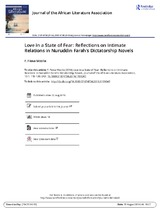| dc.contributor.author | Moolla, F. Fiona | |
| dc.date.accessioned | 2022-01-27T09:34:42Z | |
| dc.date.available | 2022-01-27T09:34:42Z | |
| dc.date.issued | 2016 | |
| dc.identifier.citation | F. Fiona Moolla (2016) Love in a State of Fear: Reflections on Intimate Relations in Nuruddin Farah's Dictatorship Novels, Journal of the African Literature Association, 10:1, 118-130, DOI: 10.1080/21674736.2016.1199347 | en_US |
| dc.identifier.uri | https://doi.org/10.1080/21674736.2016.1199347 | |
| dc.identifier.uri | http://hdl.handle.net/10566/7131 | |
| dc.description.abstract | Romantic love, shot through with passion and the erotic, has extremely rarely been the focus
of the study of African oral traditions or a theme considered in African literature criticism. This
situation prevails despite the fact that love is a powerful catalyst in most oratures and
literatures in both indigenous and European languages from the period of their origins. This
lacuna in scholarship is partially addressed through foregrounding the love which seems to
be a ubiquitous but erased presence in African novels through an analysis of the dictatorship
novels of Nuruddin Farah. The novels studied are Sardines (1981), Close Sesame (1983) and
Gifts (1992). Farah’s novels foreground a number of dominant ideas about love but also
unique conceptions about intimate relationships in the context of an authoritarian
postcolonial state where the dictator himself demands a form of love and love itself holds the
threat of becoming a form of dictatorship | en_US |
| dc.language.iso | en | en_US |
| dc.publisher | Routledge | en_US |
| dc.subject | state of fear | en_US |
| dc.subject | reflections | en_US |
| dc.subject | intimate relations | en_US |
| dc.subject | Nuruddin Farah | en_US |
| dc.title | Love in a State of Fear: Reflections on Intimate Relations in Nuruddin Farah's Dictatorship Novels | en_US |
| dc.type | Article | en_US |

